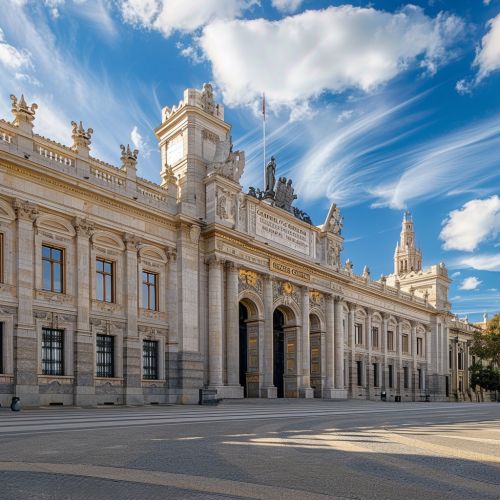Cortes Generales
Overview
The Cortes Generales is the supreme legislative body in the Kingdom of Spain. It represents the Spanish people and is vested with legislative power. The Cortes Generales consists of two chambers: the Congress of Deputies and the Senate, which meet in separate chambers in the Palace of the Cortes in Madrid.
History
The term "Cortes" dates back to the feudal period in Spain, when representative assemblies, or "courts," were convened by the monarch to discuss matters of state. The modern Cortes Generales traces its origins to the Cortes of León of 1188, considered the first example of a parliamentary body in Europe.
Structure and Composition
The Cortes Generales is a bicameral parliament, composed of the Congress of Deputies and the Senate. The Congress of Deputies is the lower house and is directly elected by the people, while the Senate is considered the upper house, with senators elected by both direct and indirect means.
Powers and Functions
The Cortes Generales is vested with legislative power, including the ability to pass laws, approve budgets, and ratify international treaties. It also has the power to control the actions of the government through the process of interpellation and censure.
Electoral System
Members of the Cortes Generales are elected through a system of proportional representation. The Congress of Deputies is composed of 350 members, elected from 50 multi-member districts. The Senate, on the other hand, has 266 members, with 208 elected from 59 multi-member districts and 58 appointed by the regional legislatures.
Role in Government Formation
The Cortes Generales plays a crucial role in the formation of the government. The monarch, who is the head of state, appoints the candidate proposed by the Congress of Deputies to form a government. This candidate must then seek the confidence of the Congress to be appointed as the Prime Minister.
Relationship with the Monarch
The monarch's role in relation to the Cortes Generales is largely ceremonial. The monarch opens and closes each legislative session, sanctions and promulgates laws, and calls for elections on the advice of the Prime Minister.
Criticisms and Controversies
The Cortes Generales has faced criticism for its perceived inefficiency and lack of representativeness. Critics argue that the electoral system favors larger parties and does not adequately represent smaller parties and minority groups.
See Also


